Past Events
Interested in Cotsen events? Sign up for our mailing list.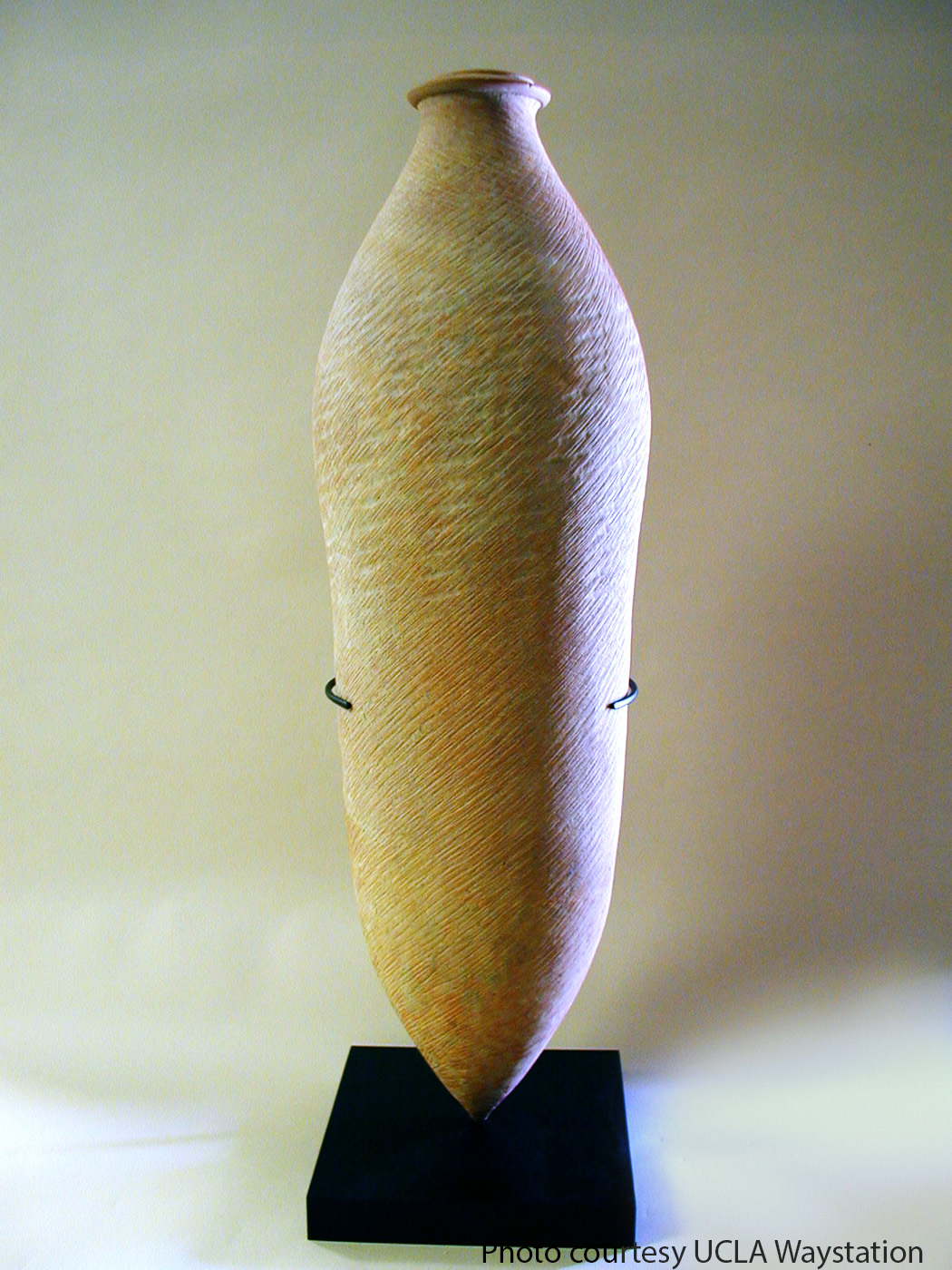 Recent studies in comparative-historical linguistics and genetics have provided valuable insights into the origins and flourishing of the Sino-Tibetan language family, one of the largest in the world. Evidence suggests that this linguistic group emerged and thrived approximately 8000-5000 years ago in the Yellow River valley, north China. Notably, the divergence of proto-Sino Tibetan languages occurred around 5900 years ago. These significant linguistic shifts coincided with archaeological findings that point to the development of the Yangshao culture and its expansion towards the Tibetan Plateau, in both westward and southwestward directions. The Yangshao culture, renowned for its centripetal settlement layouts, large public buildings, highly developed painted pottery, and the use of amphorae for producing and consuming alcoholic beverages, fostered a culture of communal ritual feasts. These communal feasting activities played a crucial role in establishing diverse social relations and reinforcing cultural identity through the production, processing, and sharing of food and alcoholic beverages. This practice emphasized collaboration and connections among related groups during the expansion of proto Sino-Tibetan populations into new territories, occurring amidst a period of climatic fluctuations.
Recent studies in comparative-historical linguistics and genetics have provided valuable insights into the origins and flourishing of the Sino-Tibetan language family, one of the largest in the world. Evidence suggests that this linguistic group emerged and thrived approximately 8000-5000 years ago in the Yellow River valley, north China. Notably, the divergence of proto-Sino Tibetan languages occurred around 5900 years ago. These significant linguistic shifts coincided with archaeological findings that point to the development of the Yangshao culture and its expansion towards the Tibetan Plateau, in both westward and southwestward directions. The Yangshao culture, renowned for its centripetal settlement layouts, large public buildings, highly developed painted pottery, and the use of amphorae for producing and consuming alcoholic beverages, fostered a culture of communal ritual feasts. These communal feasting activities played a crucial role in establishing diverse social relations and reinforcing cultural identity through the production, processing, and sharing of food and alcoholic beverages. This practice emphasized collaboration and connections among related groups during the expansion of proto Sino-Tibetan populations into new territories, occurring amidst a period of climatic fluctuations.
Li Liu is the Sir Robert Ho Tung Professor in Chinese Archaeology Stanford University. She joined the Stanford faculty in 2010. Previously, she taught archaeology at La Trobe University in Melbourne, Australia for 14 years and was elected as a Fellow of the Academy of Humanities in Australia. She has a BA in History (Archaeology Major) from Northwest University in China, an MA in Anthropology from Temple University in Philadelphia, and a PhD in Anthropology from Harvard University. Her research interests include the archaeology of early China (Neolithic and Bronze Age), ritual practice in ancient China, cultural interaction between China and other parts of the Old World, domestication of plants and animals in China, development of complex societies and state formation, settlement archaeology, and urbanism.
We gratefully acknowledge the support of the UCLA Waystation Initiative, Cyrus Tang Foundation, UCLA Center for Chinese Studies, and the UCLA Richard C. Rudolph East Asian Library.
Contact Lyssa Stapleton
Email waystation@ioa.ucla.edu
Phone
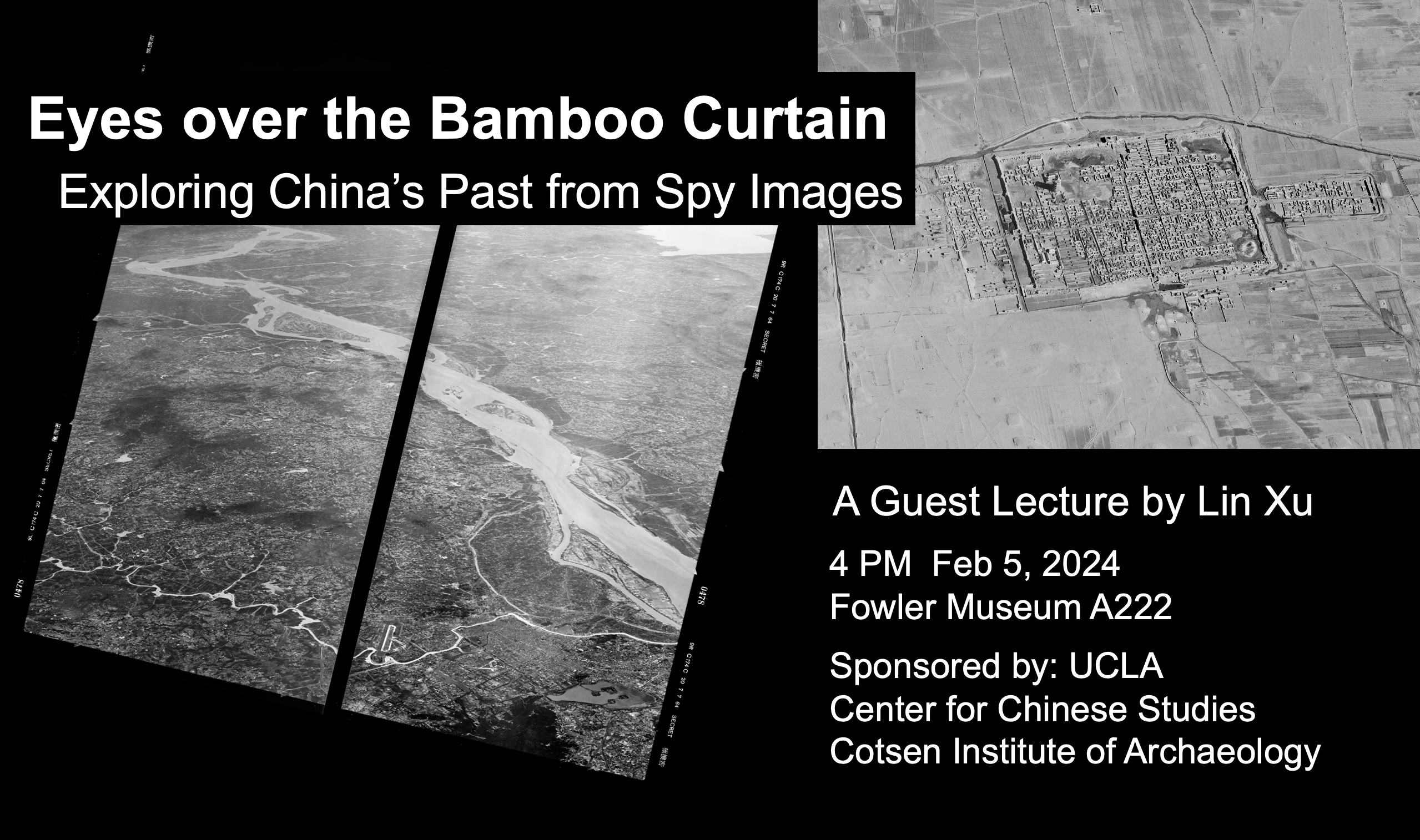
ABSTRACT: During the Cold War the Central Intelligence Agency, with the help of ROC government in Taiwan and ROC Air Force, flew U-2 spy planes missions over Mainland China between 1957 and 1968. A good portion of China was covered. After the films were declassified by the CIA and by the ROCAF, Lin has been doing researches, collecting and indexing these images in the past 15 years. He has been working with the National Archives and Academia Sinica, and providing help and images to researchers in the area of remote sensing archeology, military history and architectural history.
The CIA took these photos right at the dawn of rapid population growth and large scale urbanization of modern China. With these images you are able to peek into China’s past. In this presentation Lin will give a brief history of the spy missions, aerial photograph equipment used, and a good number of image samples over China and some other portions of the world.
BIO: Lin XU is an independent researcher specializing in curating and georeferencing declassified images collected by U.S. military and intelligence agencies using aerial and space-based platforms. In collaboration with U.S. National Archives and Academia Sinica, Lin has put together a large collection of legacy remote sensing images over China to support academic institutions engaged in research on archeology, architectural history, and historical geography. He lives in Boston and works as a computer engineer for an IT company he co-founded.
Contact Sumiji Takahashi
Email sutakahashi@ioa.ucla.edu
Phone 310-825-4169
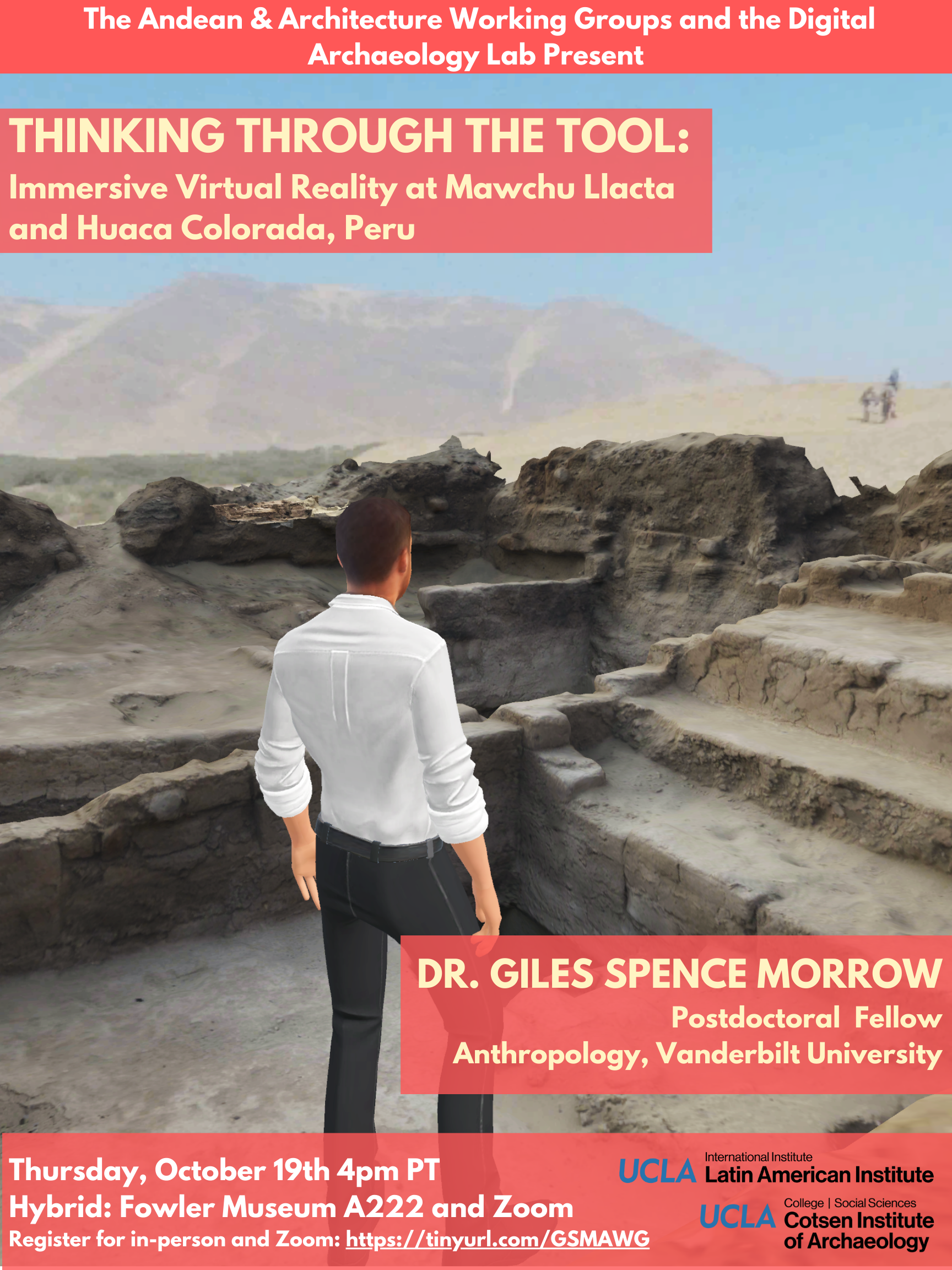
Contact Rachel Schloss
Email rachelschloss@ucla.edu
Phone
The Andean Working Group presents "Materiality of Wak'as: Between History and Archaeology at Sacsayhuaman, Cuzco" by Peter Kaulicke, Professor in the Humanities Department at the Pontificia Universidad Católica del Perú.
Registration is required. Register here.
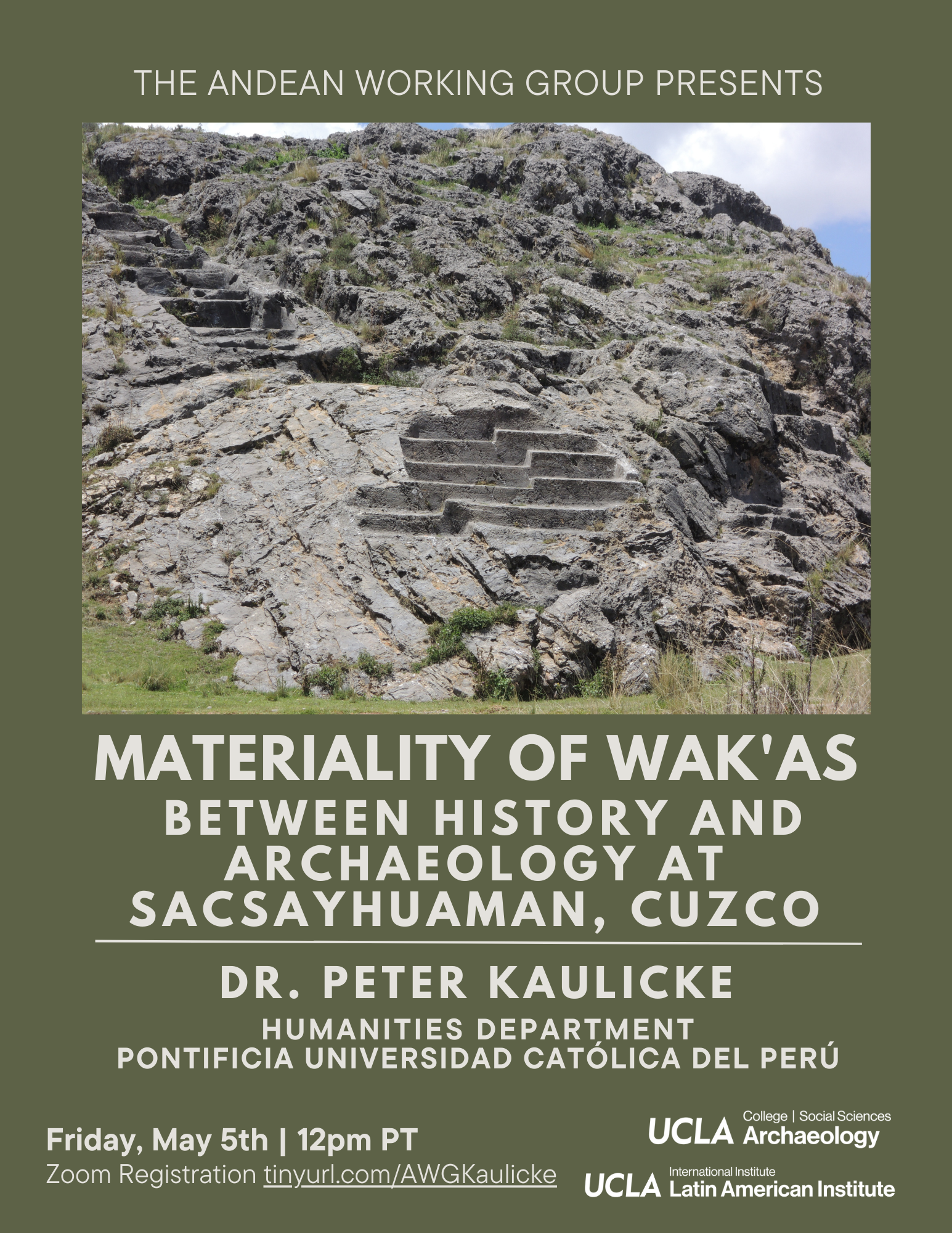
This event was co-sponsored by the Cotsen Institute of Archaeology and the UCLA Latin American Institute
Contact Alba Menéndez Pereda
Email albamenendez@ucla.edu
Phone
The Architecture Lab Working Group presents "Digital Reconstruction of the Pharos Lighthouse of Alexandria" by Anthony Caldwell. Please see the flyer below for details.
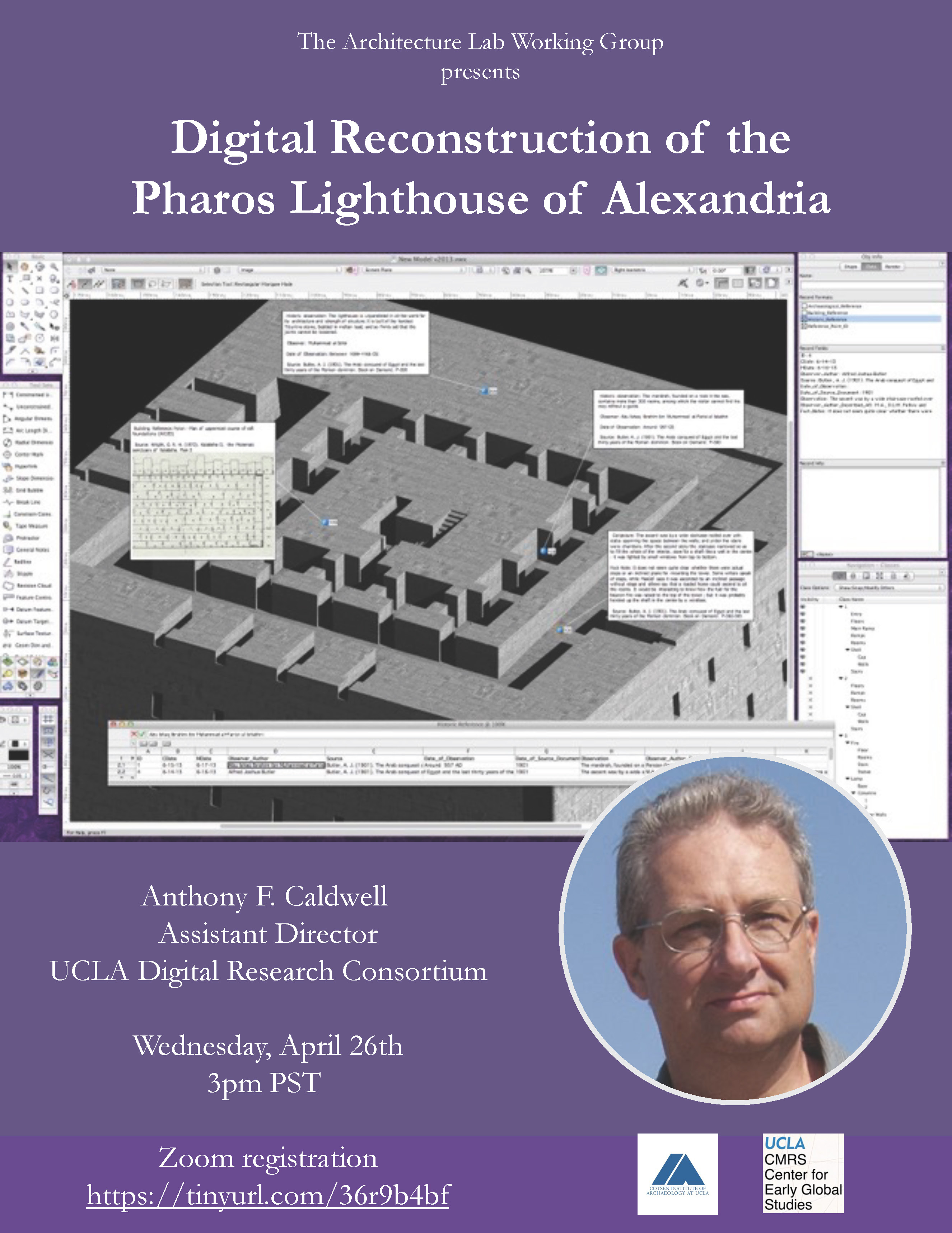
Contact AJ Meyer
Email ajmeyermaya@ucla.edu
Phone
The conference is co-organized by Stella Nair (University of California, Los Angeles) and Paul Niell (Florida State University), who are joined by Dr. Shannon Speed (University of California, Los Angeles) for the organization of the workshops. This project is made possible through support from the Terra Foundation for American Art, and is co-sponsored by the UCLA American Indian Studies Center and UCLA Latin American Institute.
To register for in-person conference attendance at the Clark Library (Friday and Saturday morning), please, email c1718cs@humnet.ucla.edu Additionally, the conference talks will be livestreamed on the UCLA Center for 17th- & 18th-Century Studies YouTube channel.
Register here to attend the workshop that will take place in person only in the afternoon of Saturday, April 15 at the Chumash Museum in Los Angeles.
For more information, see flyers below and check the event's own website and that of the Center for 17th- & 18th-Century Studies.
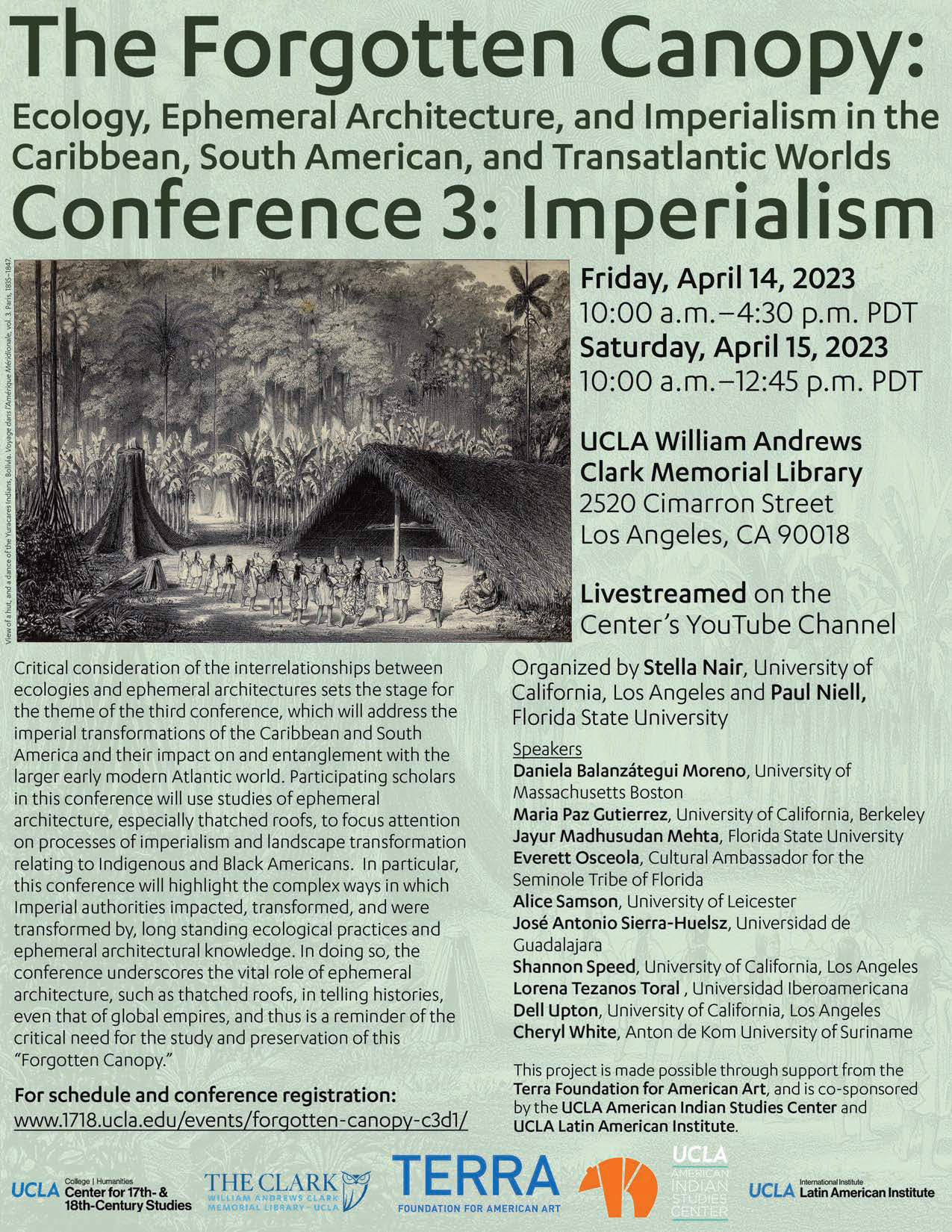
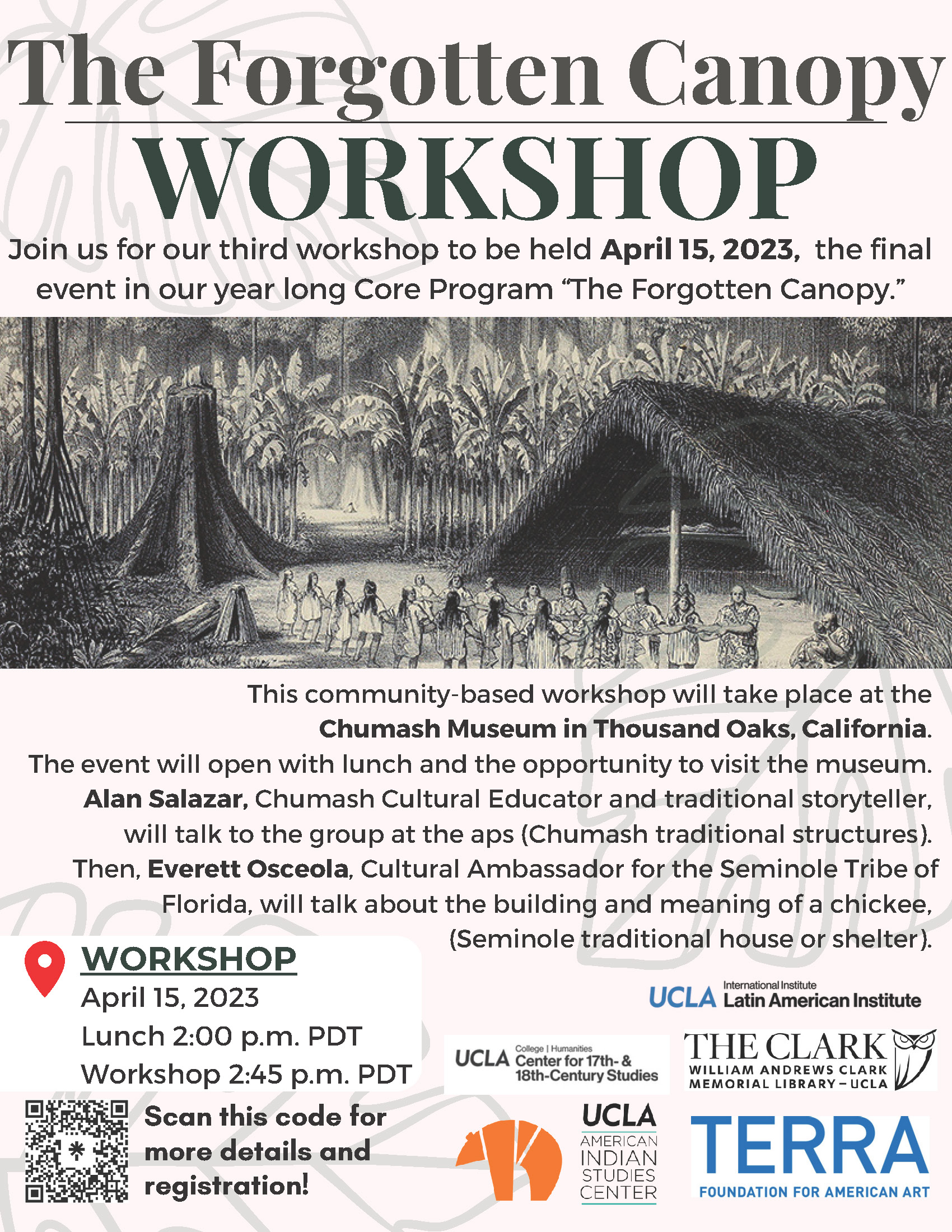
Contact Stella Nair
Email theforgottencanopy1496@gmail.com
Phone
Parker VanValkenburgh
Associate Professor in the Anthropology Department at Brown University
Friday, March 3rd 12pm PT
Register at https://tinyurl.com/AWGKuelap
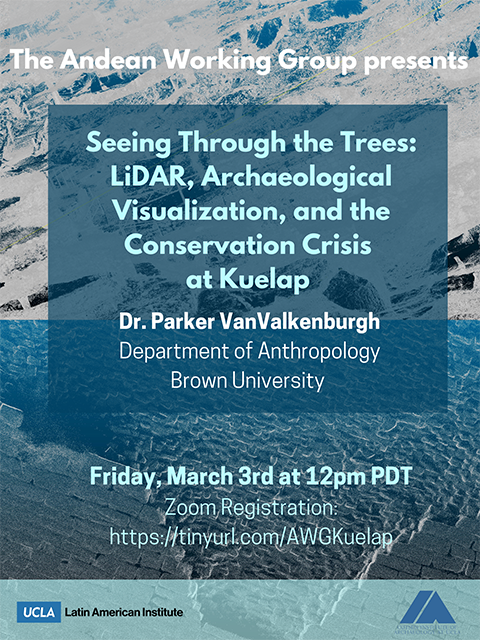
Organized by the Andean Working Group and cosponsored by the Cotsen Institute of Archaeology and the UCLA Latin American Institute
Contact Rachel Schloss
Email rachelschloss@g.ucla.edu
Phone
Register here: https://ucla.zoom.us/meeting/register/tJEtf-iqrjMiE9GbpWrFQZUs-gaEOVNF2zKG
Few of the world's premodern polities outside of China achieved the scale or density of urbanism
found in the 9th-15th century Angkor empire, which governed a substantial swath of mainland
Southeast Asia. Angkorian rulers built cities, water reservoirs, stone monuments, and roads that
crisscrossed the empire. Carved images glorify their gods, rulers, and ancestors; inscribed stelae
celebrate political accessions and conquests, and narrate religious merits, economic properties,
and status of the populations. Heng will introduce the ancient metropolis of Angkor and its Khmer
world through recent archaeological findings using historical sources, excavation and remotely
sensed ground survey (LIDAR) data. Heng is the 2022-24 postdoctoral scholar at the Cotsen Institute
and the Program for Early Modern Southeast Asia (PEMSEA). His research interests include religious
change, urbanism, political economy, public archaeology, and heritage management. He was a featured
commentator in "Angkor 3D: The Lost Empire of Cambodia," at the California Science Center IMAX
theater.

Contact
Phone
Phidias Unbound: How Robot-Generated Replicas Could Solve the Parthenon Marbles Quandary
Roger Michel
Executive Director, The Institute for Digital Archaeology
Please submit your questions in advance of the webinar via email to:
hnadworny@support.ucla.edu by Wednesday, October 12 at 12:00 p.m.
Instructions to join the webinar will be provided once your registration
has been confirmed.
About the program:
The Parthenon Marbles, commonly known as the Elgin Marbles, were removed from the ancient Acropolis of Athens in 1801 by Lord Elgin, British ambassador to the Ottoman Empire. Carved by the sculptor Phidias, they were eventually sold to the British government in 1817 and are housed in the British Museum. Public debate about repatriating the marbles is heated and ongoing.Can the creation of exact copies of the originals resolve the repatriation quandary? Roger Michel, executive director of the Institute of Digital Archaeology, at the University of Oxford, believes the repatriation issue can be resolved with the help of 3-D machining. His research team has developed a robot with the ability to create faithful copies of large historical objects. Michel will explore humanity’s connection to culturally significant objects and the emphasis we place on physical possession. Is possession an inherently colonial concept? Are heritage assets particularly susceptible to being exploited for the purposes of historical revisionism? Under what circumstances can copies provide satisfactory substitutes for original material? These questions will be examined against the backdrop of the IDA’s ongoing Elgin repatriation efforts.
About the speaker:
Roger Michel is the founder and Executive Director of the Institute for Digital Archaeology (IDA). The IDA operates globally, undertaking a huge variety of heritage projects, many of which are aimed at advancing social justice goals. Its principal partners are the UN, UNESCO and local and national governments. Mr Michel has published and lectured frequently on various heritage conservation topics. He was a member of the faculty at BU Law School for 25 years, is an Honorary Fellow of Trinity College (Oxford), and is co-publisher of Arion Magazine. Mr Michel is a graduate of Harvard and Oxford Universities.

https://conservation.ucla.edu/event/phidias-unbound-how-robot-generated-...
Contact
Phone
Jonathan Mark Kenoyer
George F. Dales Jr. and Barbara A. Dales Professor of Anthropology
Department of Anthropology, University of Wisconsin, Madison.
Date & time: April 9th, 2022 at 1:00PM PT
A general overview of the Indus Civilization will be presented along with discussions of how archaeologists find sites, how they excavate them and how they study the artifacts that are discovered from the sites. Special focus will be on some of the traditional as well as innovative new techniques that archaeologists use to discover sites. It will also cover some important analytical approaches that are used to study different types of artifacts to gain unique information about the technologies and social organization of the ancient Indus communities.
Jonathan Mark Kenoyer, is the George F. Dales Jr. and Barbara A. Dales Professor of Anthropology, at the Department of Anthropology, University of Wisconsin, Madison. He is the author of numerous books and edited volumes on the archaeology of South Asia and the Indus civilization. He has excavated key ancient cities and elucidated contemporary urban patterns in Pakistan and India. He is a leading figure in South Asian archaeology, history, and ancient civilizations.
Contact Michelle Jacobson
Email mjacobson@ioa.ucla.edu
Phone
- ‹ previous
- 2 of 7
- next ›


